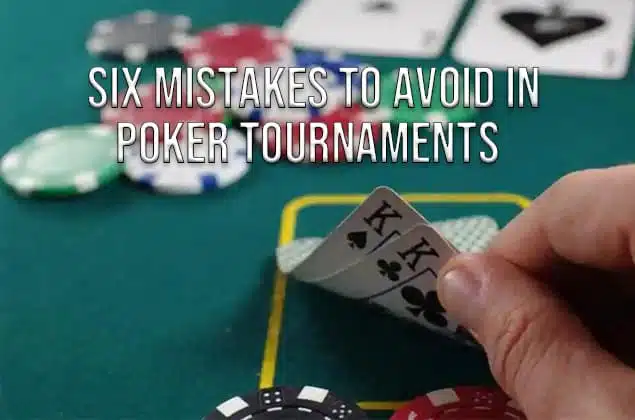Entering the thrilling world of poker tournaments can be both exciting and intimidating. However, one of the smartest moves a player can make is to learn about the **mistakes to avoid in poker tournaments**. This awareness can dramatically enhance your tournament strategy, boosting your chances of reaching the final table. From chip preservation to understanding position play in poker, savvy players know that each decision counts. Moreover, being adept at reading opponents in poker and balancing aggressive play can set the stage for a successful campaign in any tournament.
Navigating the competitive environment of poker contests requires more than just basic knowledge; it demands a keen awareness of common pitfalls that can derail your chances of victory. Understanding critical aspects like tournament strategy and the importance of chip management is essential. Players are often faced with varying dynamics, and adapting your tactics can make all the difference in your performance. Emphasizing the value of position at the table and effectively reading your competitors can lead to informed decisions that positively influence your outcomes. Ultimately, embracing these strategies can transform your approach to competitions, turning them into opportunities for success.
Common Mistakes to Avoid in Poker Tournaments
Participating in poker tournaments can be a thrilling experience, yet many players stumble due to their inability to recognize critical mistakes. One of the most significant missteps is failing to adapt to the changing dynamics of the game. A common occurrence is when players rigidly stick to strategies that were successful early on. However, as the blinds increase and the pressure mounts, flexibility becomes essential. Adapting your approach based on the evolving situation at the table—such as considering chip preservation and opponent behavior—can drastically impact your chances of success.
Another frequent oversight is neglecting to observe and read opponents effectively, which can lead to poor decision-making. Understanding betting patterns and behavioral tendencies allows players to strategize more effectively during crucial situations. Ignoring these aspects turns a potentially advantageous position into a missed opportunity, particularly in the middle stages of a tournament when aggression must be balanced with caution. Recognizing and correcting these mistakes is vital for anyone looking to secure victory in poker tournaments.
Smart Strategies to Enhance Your Tournament Play
In tournaments, having a well-structured strategy can greatly enhance your performance at the tables. One of the key elements is practicing effective chip preservation. This not only requires understanding the significance of your stack relative to the blinds but also the importance of wisely selecting the right moments to engage in pots. By approaching early hands cautiously—opting for quality cards over risky bets—you can build your chip count steadily while avoiding disastrous losses. This strategy vitalizes your chances of surviving the tournament’s later, more aggressive stages.
Position play in poker also plays a crucial role in devising a winning strategy. Recognizing when to take advantage of late position can create unique opportunities for stealing blinds and gaining an edge over opponents who may be less aware of their positional disadvantage. By strategically leveraging this to your favor, you can amplify pressure on passive players while protecting your chip stack. Implementing these smart strategies while avoiding common mistakes can enhance your overall tournament experience and significantly increase your chances of going deep in competition.
Frequently Asked Questions
What are the most critical mistakes to avoid in poker tournaments?
In poker tournaments, it’s crucial to avoid key mistakes such as failing to adapt your tournament strategy to changing circumstances, overcommitting chips in early hands, neglecting position play, ignoring opponent reads, and playing too passively. By understanding chip preservation strategies and adjusting your play style according to your position and opponents, you can significantly improve your chances of success.
How can I improve my tournament strategy and avoid common mistakes?
To enhance your tournament strategy and avoid common mistakes, focus on chip preservation early in the tournament, adapt your play to the changing dynamics of the game, and pay close attention to your opponents’ behaviors. Understanding position play can also help you make informed decisions, while balancing aggressive play with caution will allow you to capitalize on opportunities without risking too much of your stack. Effective reading of opponents in poker allows you to exploit weaknesses and refine your strategy throughout the tournament.
| Mistake | Description | Consequences |
|---|---|---|
| Failing to Adapt to Changing Circumstances | Sticking to a fixed strategy instead of adjusting to the game’s evolving nature. | Could lead to missed opportunities and reduced chip stack. |
| Overcommitting in Early Hands | Risking too many chips early in the tournament rather than preserving them. | Could result in early elimination from the tournament. |
| Ignoring Position Play | Neglecting position can lead to missed opportunities or unnecessary losses. | Increased risk due to uncalculated plays. |
| Neglecting Opponent Reads | Focusing too much on your cards and not enough on your opponents’ actions. | Leads to poor decision-making and potential losses. |
| Playing Too Passively | Being overly cautious during crucial tournament stages. | Can result in missed opportunities to accumulate chips. |
Summary
Mistakes to avoid in poker tournaments can make a significant difference in your success at the tables. Understanding the common pitfalls, such as failing to adapt your strategy, overcommitting in early hands, and neglecting the importance of your position, can enhance your decision-making. By being aware of your opponents and avoiding overly passive play, you pave the way for a stronger performance. Embracing these insights allows you to navigate the tournament landscape more effectively, increasing your chances of reaching the final stages and ultimately winning that coveted prize.
